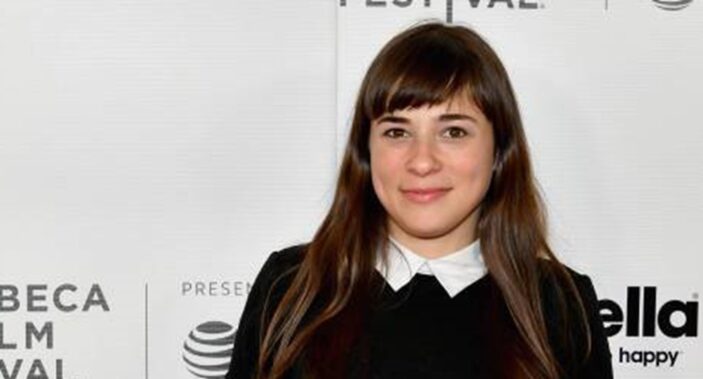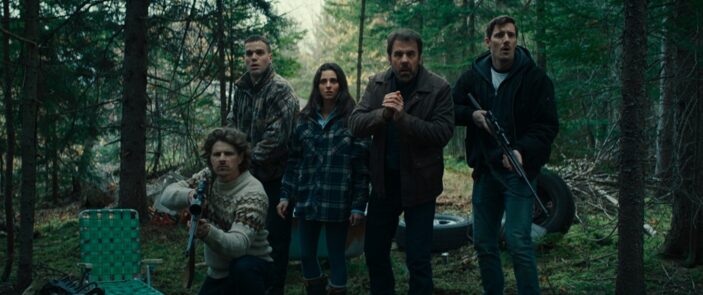
Nina, a young and headstrong exotic dancer, finds herself stranded in the far North. She convinces her recent customers, five men on a bachelor hunting trip, to put her up for a few days. In this masculine microsociety, by turns hilarious and philosophical, she starts to feel a sense of belonging she never has before. But a mysterious stranger’s arrival changes the course of this improvised holiday forever.
Such is the logline for the unpredictable thriller Hunting Daze, a genre-blending journey that writer/director Annick Blanc guides with unnerving precision and a dark comedic edge. As the film prepares for its World Premiere at this year’s SXSW Film & TV Festival in the edge-of-your-seat Midnighters Selection, Peter Gray spoke with Blanc about how this story came to fruition, why she turned her lead actress down for the role originally, and finding her narrative balance between honesty and the surreal.
This film took me by complete surprise. It never travelled where I thought it would! How did this idea originate for you?
I think I wanted to kind of point fingers at the fact that we live our lives, right now, just always blinding ourselves. We leave the moment and join the party as the world kind of crumbles around us. We think that the group (we’re in) is going to save the situation, right? I’m lost in my daily life trying to enjoy my life, and I wanted to kind of put that into a fable. Into a metaphor. So, that’s when all the craziness gets added, right? I didn’t want to make a realistic film. Not totally. But I wanted to talk about that under the cover of a dream or a metaphor. Something intense to really shake the audience.
It balances a few tones throughout. Did it ever start out as one thing and then organically morph to something else? Or did you always know it was going to feel this way?
That’s usually what I like to do. With my previous shorts, I made three shorts before this, it’s the way I experience life. When I’m the most happiest is also when I’m the most sensitive. I feel that when you live emotions fully and a lot of them together, that’s when you kind of are more open to more emotions, and then they come and it’s kind of like a rolling ball. Right? For me, it’s natural to have the viewer experience that (too). I also like the fact that the viewer is then surprised and doesn’t know what to expect. I like that. Especially in this movie where I touch on themes of toxic relationships, gaslighting, manipulation…I like for the viewer to live the same thing as the characters.
That was definitely part of the story that resonated with me. Unfortunately I have been through a situation where people I trusted were ultimately gaslighting me and making my mind go to places it shouldn’t have. It’s weird to be entertained by that. But that’s one of the great things about art. That it can be a throughline for people to work out their shit, almost.
Yeah. It was important for me to pinpoint when you’re being manipulated. You have to fall in love first, right? Often that’s what happens. Those people will seduce you. They’ll make you laugh and they’ll connect with you, and that’s what makes it so hard to leave. You feel like you’re crazy. You ask if you’re the one that’s wrong. But I also wanted to make the film entertaining, as you say, so it’s really this dichotomic experience where you are both stressed and very entertained, just as the characters are.
I would love to see what you could do with a feature length horror film. Is there a genre you’d love to tackle?
Yeah, I think I just haven’t found the right horror film (yet). I’ve written something else for my next feature. I wrote the synopsis for it, and there’s a little bit of the genre in it, but it’s missing the intensity of the genre. It’s more a psychological horror. In the writing it’s always nice to have something to fight for, you know? Otherwise, when you write about something just nice, so many things can happen. But when you have a strong and clear fight…I do have a horror movie in me.
Nahéma Ricci is incredible in this. How did she come onto your radar? I’ve never seen her in anything, and she just has this magnetic presence.
Nahéma is the kind of actress that you look at. You don’t look at her in the monitor. You almost have to remind yourself to look in the monitor as you’re filming. The camera just loves her. There’s something in her eyes. But she was more known for doing tomboy-ish roles. She had shaved her head, and she was always the victim. All the movies I had seen her in were like that. So when we were casting for this, I actually said no to her auditioning. I think about 5 times I said no. I didn’t think she had the right sensuality for it. I didn’t think she was that kind of girl. So, we saw everybody else. And we never found our Nina. That character is such a specific character.
In the end I was like, “Maybe we should see Nahéma,” so I gave a call to a friend and asked, and they told me that a role like Nina is all she’s wanted to do. She was tired of being the victim. She wants to fight the world. So when she entered the room she had grown long hair, and she had dressed for the part, and…it was Nina. I felt like an idiot at that time, for sure. I shouldn’t have had my misconceptions. But it was a great encounter.

The dynamic between her character and the group of guys is so important. Had they already been cast by the time she came into the project? Or did you want to find Nina first?
We found the guys much quicker. They were all together during the casting process. During the final round of auditions, we had three or four of them reading. It was more like an acting workshop. These are complicated characters, so we could see when they were connecting more with an actress. We’d see how they’d participate in the process. They were amazing.
I feel like the film really shifts during the scene where “the stranger” is injured. The way that scene was framed and the reveal…is that an easy scene to write? Did you always know how impactful it was going to be? Or is that something you discover in the edit?
It was one of the first things I wrote that really stuck. There was something in that scene that I had visualised the most. The tone of the scene was very clear to me. This script had so many versions. I started writing this in 2011, so it went through many, many, many changes. It was a completely different story at the beginning. But this one scene was always incorporated. It never really changed. For me, this was always a key moment.
I think the one thing that was really relatable in that scene was the awkward laughter that precedes the “reveal”. It’s this very real moment in a very exaggerated situation…
It’s so funny that you say this about the real and surreal, because that’s what proved tough for the actors. I was asking them to live these scenes that could look like a parody of what life could be. But live it completely and realistically. I asked them how they would react as humans. It always came back to not making a caricature of a scene, even though what was going on was a caricature in some way. It’s this really strange mix of being on the verge of “Am I dreaming?” It’s strangely familiar, but so weird at the same time, you know?
And the song choice of “Happy Together” is so wonderfully ironic when it’s played. Did you always know you wanted that song? Or was that something you thought of over time?
I wanted that (song) for a long time. I didn’t dare ask for it though. I’m a producer on this too, and I told my associate that I would love the movie to end (with this song), but I thought it would be too expensive to get the rights. But I guess the same as Nahéma, you just have to stick to your guns, right? I was hoping we could get it into the movie, but we had such a tight budget so we thought we would just see how things go. But, of course I loved the irony of that song use, but it was also about making the audience feel something. Hearing that song puts you in the car with them. You feel close to these characters, so it was important for that song to be there. And we got it in the end.
Given that you are a producer as well, did you find having so many hats make the process easier or more difficult?
Yeah, I don’t know if I’d recommend doing it (laughs). It’s tiring. I have a very good business partner and CO producer, and I trust them a lot. We work fast together, so that helps. When we get closer to the movie we hire a line producer, and I try to take less of a producing role, but you can never completely disconnect when it’s your company, right? It’s very stressful. It’s a lot of work. It can be very hard on you as a human. Some people think it gives you more control, but at the same time, you are more realistic in what you can get. Sometimes you ask less as well. I think some people think the producers are just taking all the money and that they’re rich, but it’s actually the contrary. They give their life to their companies. They’re paying insurance to their employees, and security. They really put themselves on the rope. It isn’t always the great spot to be in.
Hunting Daze is screening as part of this year’s SXSW Film & TV Festival, running between March 8th and 16th, 2024. For more information on this year’s festival, head to the official SXSW website.
